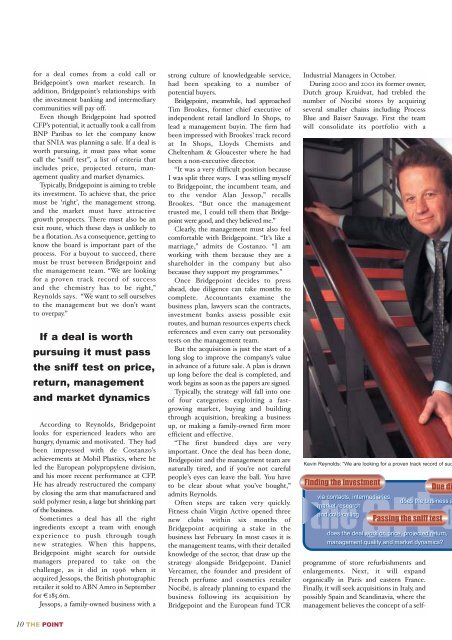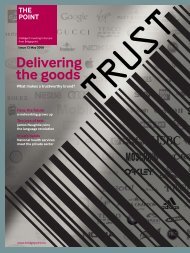Point 2 - 2/11. FINAL - Bridgepoint Capital
Point 2 - 2/11. FINAL - Bridgepoint Capital
Point 2 - 2/11. FINAL - Bridgepoint Capital
You also want an ePaper? Increase the reach of your titles
YUMPU automatically turns print PDFs into web optimized ePapers that Google loves.
for a deal comes from a cold call or<strong>Bridgepoint</strong>’s own market research. Inaddition, <strong>Bridgepoint</strong>’s relationships withthe investment banking and intermediarycommunities will pay off.Even though <strong>Bridgepoint</strong> had spottedCFP’s potential, it actually took a call fromBNP Paribas to let the company knowthat SNIA was planning a sale. If a deal isworth pursuing, it must pass what somecall the “sniff test”, a list of criteria thatincludes price, projected return, managementquality and market dynamics.Typically, <strong>Bridgepoint</strong> is aiming to trebleits investment. To achieve that, the pricemust be ‘right’, the management strong,and the market must have attractivegrowth prospects. There must also be anexit route, which these days is unlikely tobe a flotation. As a consequence, getting toknow the board is important part of theprocess. For a buyout to succeed, theremust be trust between <strong>Bridgepoint</strong> andthe management team. “We are lookingfor a proven track record of successand the chemistry has to be right,”Reynolds says. “We want to sell ourselvesto the management but we don’t wantto overpay.”If a deal is worthpursuing it must passthe sniff test on price,return, managementand market dynamicsAccording to Reynolds, <strong>Bridgepoint</strong>looks for experienced leaders who arehungry, dynamic and motivated. They hadbeen impressed with de Costanzo’sachievements at Mobil Plastics, where heled the European polypropylene division,and his more recent performance at CFP.He has already restructured the companyby closing the arm that manufactured andsold polymer resin, a large but shrinking partof the business.Sometimes a deal has all the rightingredients except a team with enoughexperience to push through toughnew strategies. When this happens,<strong>Bridgepoint</strong> might search for outsidemanagers prepared to take on thechallenge, as it did in 1996 when itacquired Jessops, the British photographicretailer it sold to ABN Amro in Septemberfor €185.6m.Jessops, a family-owned business with astrong culture of knowledgeable service,had been speaking to a number ofpotential buyers.<strong>Bridgepoint</strong>, meanwhile, had approachedTim Brookes, former chief executive ofindependent retail landlord In Shops, tolead a management buyin. The firm hadbeen impressed with Brookes’ track recordat In Shops, Lloyds Chemists andCheltenham & Gloucester where he hadbeen a non-executive director.“It was a very difficult position becauseI was split three ways. I was selling myselfto <strong>Bridgepoint</strong>, the incumbent team, andto the vendor Alan Jessop,” recallsBrookes. “But once the managementtrusted me, I could tell them that <strong>Bridgepoint</strong>were good, and they believed me.”Clearly, the management must also feelcomfortable with <strong>Bridgepoint</strong>. “It’s like amarriage,” admits de Costanzo. “I amworking with them because they are ashareholder in the company but alsobecause they support my programmes.”Once <strong>Bridgepoint</strong> decides to pressahead, due diligence can take months tocomplete. Accountants examine thebusiness plan, lawyers scan the contracts,investment banks assess possible exitroutes, and human resources experts checkreferences and even carry out personalitytests on the management team.But the acquisition is just the start of along slog to improve the company’s valuein advance of a future sale. A plan is drawnup long before the deal is completed, andwork begins as soon as the papers are signed.Typically, the strategy will fall into oneof four categories: exploiting a fastgrowingmarket, buying and buildingthrough acquisition, breaking a businessup, or making a family-owned firm moreefficient and effective.“The first hundred days are veryimportant. Once the deal has been done,<strong>Bridgepoint</strong> and the management team arenaturally tired, and if you’re not carefulpeople’s eyes can leave the ball. You haveto be clear about what you’ve bought,”admits Reynolds.Often steps are taken very quickly.Fitness chain Virgin Active opened threenew clubs within six months of<strong>Bridgepoint</strong> acquiring a stake in thebusiness last February. In most cases it isthe management teams, with their detailedknowledge of the sector, that draw up thestrategy alongside <strong>Bridgepoint</strong>. DanielVercamer, the founder and president ofFrench perfume and cosmetics retailerNocibé, is already planning to expand thebusiness following its acquisition by<strong>Bridgepoint</strong> and the European fund TCRIndustrial Managers in October.During 2000 and 2001 its former owner,Dutch group Kruidvat, had trebled thenumber of Nocibé stores by acquiringseveral smaller chains including ProcessBlue and Baiser Sauvage. First the teamwill consolidate its portfolio with aKevin Reynolds: “We are looking for a proven track record of sucFinding the investmentvia contacts, intermediaries,market researchand cold-callingprogramme of store refurbishments andenlargements. Next, it will expandorganically in Paris and eastern France.Finally, it will seek acquisitions in Italy, andpossibly Spain and Scandinavia, where themanagement believes the concept of a self-via contacts, intermediaries,the odoes the deal work on price, projected return,didoes the business aPassing the sniff testartDuedoes the deal work on price, projected return,management quality and market dynamics?10 THE POINT









